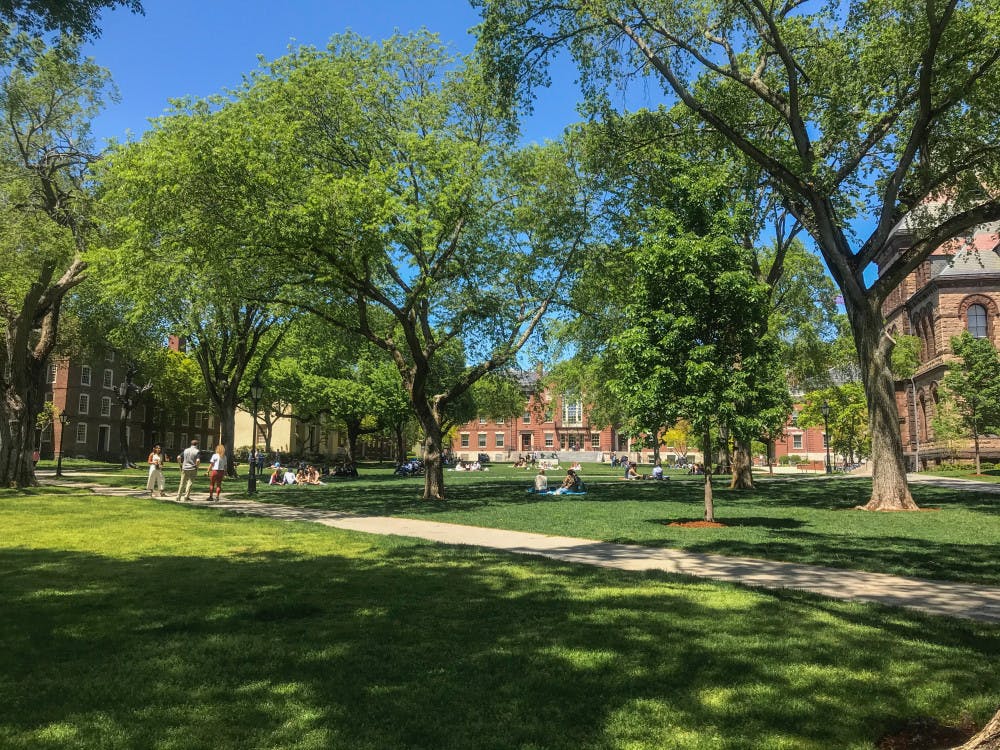During the Spring Weekend that never was, Jordana Siegel ’20 found herself drawn to the Main Green.
With a group of friends, Siegel walked the Green and played the music of Spring Weekend artists past. Siegel is one of many seniors who opted to stay in Providence — either by choice or necessity — for the last few months of her final semester, remaining in her house on the corner of Power and Brook Streets as other seniors scattered across the country and the world.
The music, Siegel said, ended up doing little to alleviate the pain of a senior spring that was very different from what she had imagined.
“I don’t find myself going on campus that much,” Siegel admitted. “It reminds me of all that’s been lost, and all the memories that we were supposed to be making.”
According to six seniors interviewed by The Herald, the spring semester that fell apart has been marked by canceled jazz concerts and festivals, incomplete unit wars traditions and hasty goodbyes — with little to fill the void but time at home with housemates and takeout food from old haunts.
No more than 365 students lived in University dorms after campus shut down, The Herald previously reported, and University Spokesperson Brian Clark said that because the University does not own the seniors’ off-campus properties, the number of students who remained in their off-campus houses and apartments is unknown.
“Our strong preference was for off-campus students in properties not owned by Brown to return to their homes or other locations if possible,” Clark wrote in an email, citing the University’s “limited” ability to support off-campus students, while noting that it remained a personal choice.
Choosing to Stay
For students like Vishie Betapudi ’20, deciding between going home to family and staying on campus came down to figuring out where he wanted to be “stuck indefinitely.” Ultimately, he chose to move from New Dorm to his girlfriend’s apartment on John Street, opting to live with her roommate, dog and two cats rather than return to his home outside Cleveland, Ohio.
Though he had been planning to move in with his partner after graduating, Betapudi said the transition felt somewhat unexpected. Their cohabitation suddenly involved grocery shopping, cooking and remaining safe, with extra care because his partner is immunocompromised.
“Almost every day, I think about what it would have been like if I would have gone home — if I was at home, I would have much less of a burden with all of that,” he said. “It feels like we’ve really had to grow up a lot faster.”
Siegel remained in Providence with eight other fourth-year women after listening to her parents, who thought it would be best to stay. For some who remained in the city, the chance for a final few months with old and important friends kept them on College Hill, while others found it too difficult to return home amid the personal, medical and financial problems wrought by the pandemic.
“I thought it would be nice to get through this strange time with two people that are so important to me,” said Claire Hathaway ’20.
For Kielan Donahue ’20, academic needs were on her mind when making the decision to stay. In Providence, Donahue explained, she has a room, a kitchen — and some privacy. She knew she couldn’t do schoolwork while with her family “24/7” — especially a final group project for CSCI 1430: “Computer Vision” that she had planned to do with her roommate who also stayed in Providence.
Life in Providence during COVID-19
The first weeks alone on campus proved eerie for many. Some tried to order food from restaurants only to find they had shut for the foreseeable future, while others mourned the loss of former favorite study spots like libraries and coffee shops.
“The shell of campus is there, but you can’t enter and none of the people you know are there,” Donahue said.
The seniors still on campus found virtual learning to be even more peculiar; many of their professors lectured from their classrooms or homes just miles away, but they could only meet as a class virtually.
“Everything you do reminds you of the reality of the situation,” Betapudi said. “If I’m sitting in a class a couple blocks away from Brown but I can’t actually be in class at Brown, it’s surreal. It’s jarring.”
At home, keeping busy has proved to be its own challenge. For Naomy Pedroza ’20, one solution was the occasional “socially distant bonfire.” Siegel’s household found solace in getting takeout about once a week, celebrating a roommate’s birthday and enjoying evening activities like a “mall night,” during which her housemates all shopped from clothes that the others had decided they no longer wanted.
But despite the effort to make home more enjoyable, remaining inside has had its mental costs.
“Time seems really meaningless lately,” Hathaway said. “The way in which time goes by seems incredibly distressing and nonexistent.”
Losses and Uncertainty
As graduation approaches and leases end, the usual string of events during senior spring have failed to follow.
For Donahue, losing the opportunity to relive freshman unit wars stung: One friend of hers had kept their unit’s banner for the last four years, intending to replicate the human pyramid from their first week on campus, down to the last limb.
Siegel had long looked forward to senior week, and to a Spring Weekend with all her friends who had returned from study abroad.
Betapudi lost his senior year jazz band concert, as well as the ability to go to all of his other music friends’ final concerts.
And then there were the goodbyes: rushed and uncertain, without hugs and often over Facetime for friends who did not live in the same house.
“There was certainly a lot of denial that this might be the last time we see each other for many years, especially international friends who were going home to countries that were closing borders,” Siegel said.
For many students, graduating brings with it many uncertainties. With unemployment levels at the highest they have been since the Great Depression — 14.7 percent as of April — many students have found themselves scrambling for jobs in an uncertain market. “I’m still furiously applying for jobs; hospitals will still be open. I’m on LinkedIn, Indeed, Handshake five times a day,” Betapudi said.
Silver Linings
While their final semester is not what they had in mind, some seniors have tried their best to find silver linings in what has been an extremely difficult couple of months.
For Mika Shevchenko ’20, quarantining has brought with it an opportunity to explore her passion for cooking. “I decided to start a cooking blog on Instagram for my friends,” she said. “That was the big thing that kept me going throughout quarantine.”
Others, like Pedroza, have found value in taking a step back from their busy schedules and enjoying the company of their housemates.
One “friend said that, if you think about it, we would not have been able to see each other often in senior spring under normal circumstances, because we run on completely different schedules,” Pedroza said. “This spring we were able to just be with each other — that was a nice silver lining.”
Despite the effects of COVID-19 on their final semester, this experience reminded many why the Brown community is so special. COVID-19 “has brought so many people closer together,” said Shevchenko. “You see how resilient the Brown community can be, how encouraging it can be, and how people just responded with kindness.”
“As a graduating senior, I am coming back to why I applied early decision, and that's the fact that (Brown is) such a wonderful community, and I have never felt like people were anything but supportive,” Hathaway said. “It's honestly such a wholesome place. I’m thankful — I’m very thankful.”
Correction: A previous version of this article named Kielan Donahue '20 as a design editor, when she is not. The Herald regrets the error.

Will Kubzansky was the 133rd editor-in-chief and president of the Brown Daily Herald. Previously, he served as a University News editor overseeing the admission & financial aid and staff & student labor beats. In his free time, he plays the guitar and soccer — both poorly.





